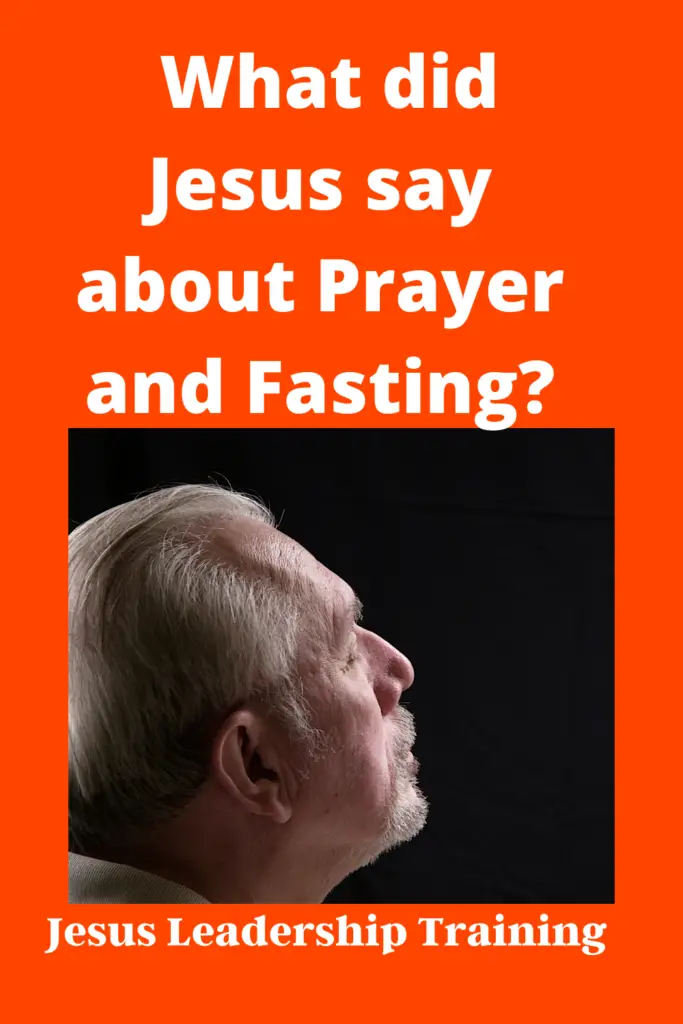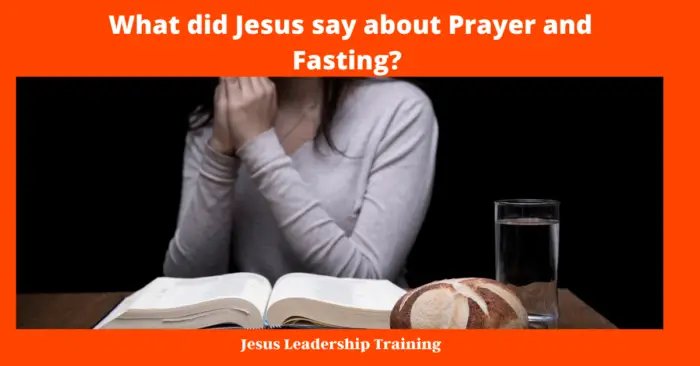Somethings Come by Fasting and Praying – Jesus talked about prayer and fasting while He was on earth, and it is a spiritual discipline that He practiced often. He said a number of things about fasting, and the one that stands out is Matthew 6:16. It says,
Table of Contents
Somethings Come by Fasting and Praying
Jesus said, “When you fast, do not look somber as the hypocrites do, for they disfigure their faces to show others they are fasting. Truly I tell you, they have received their reward in full.”
Fasting is an important spiritual discipline that Christians have practiced even before Jesus came to earth. Jesus gave us words of wisdom concerning fasting so we would do it the right way. He wants us to have the right attitude when fasting, and not use it to show others how “righteous” we are.
In Matthew 6:5-6, Jesus told us that we should not make fasting a public display or make ourselves appear different from others by altering our appearance. Rather, others should not know that we are fasting, only God needs to know. Somethings Come by Fasting and Praying
In this article, we will look at some simple lessons on prayer and fasting to help us better understand how we should do it.

How Did Jesus Fast During His Life? (Share)
One of the main accounts in the Bible that shows Jesus fasting is in Matthew 4:2. The Holy Spirit had taken Him into the wilderness for forty days and nights to be tempted by the devil. This was before Jesus began His ministry because shortly after, we read about Him preaching and calling His disciples. During his time of fasting, He overcame the temptations of the devil. From His experience, we learn that we too can overcome everything the devil throws at us when we fast.
Jesus also fasted for 40 days and nights in Matthew 4:2, Mark 1:12-13, and Luke 4:1 to prepare for His ministry. He did not eat anything during the time of fasting and prayed without ceasing. We can learn from this that fasting helps us to be close to God, and it should make a difference in our everyday life.
What Did Jesus Say About How We Should Fast? (KJV)
Jesus said we should fast privately, especially when we are praying (Matthew 6:17). We do not want to use fasting as an opportunity to show off or to be seen fasting by others. We should not even let the people closest to us know that we are fasting unless they are also fasting with us. When Jesus fasted in the desert, He was alone except for His Father. This is similar to how Elijah fasted in 1 Kings 19:9-13 when he fled from Queen Jezebel.
There are biblical examples where a few people fasted together, but these were usually during a crisis. An example of this is when Peter and John took it upon themselves too fast after they had been imprisoned (Acts 12:3-4). In this instance, the community interceded for them because everyone knew they were fasting.
12 Things Things Only Come Through Fasting and Praying (Version)
One time, a man brought his son to Jesus for healing. Jesus’ disciples could not cast out the spirit that was tormenting the boy and causing him to be epileptic. When the disciples inquired from Jesus as to why they could not cast out the demon, Jesus told them that kind could only come out through prayer and fasting (Matthew 17:20-21). Jesus also told them that they were full of unbelief.
In the above story, we can conclude that prayer and fasting would have helped the disciples to have the kind of faith needed to cast out the evil spirit. Prayer and fasting help our spirits become strong and full of faith so we can see others delivered from the oppression of the devil. Sometimes we have to pray and fast to see the deliverance and breakthrough we need from God.
Are you fasting today? It is biblical to fast, but what does God want us to do when we are fasting?
1. Fasting should be done privately – Matthew 6:17-18
2. Do not let anyone know why you are fasting – even those closest to you – Matthew 6:16
3. Fasting will include praying – Matthew 6:5-8
4. Fasting can be done to help build your trust in God – Matthew 4:2, Luke 2:37
5. The early church fasted regularly – Acts 13:2-3, 14:23
6. Jesus fasted during His ministry and before the cross – Matthew 4:2, Mark 1:12-13, Luke 4:1
7. Fasting will help you overcome temptation – Matthew 4:2
8. Jesus fasted before going into the wilderness for 40days and nights to be tempted by the devil – Matthew 4:1-11
9. Only prayer and fasting can bring deliverance to a person who is being tormented by demonic spirits – Matthew 17:20-21
10. Jesus and the early church fasted regularly for spiritual breakthroughs, such as when Saul (later called Paul) was converted on the road to Damascus – Acts 9:9
11. Fasting increases your faith – Matthew 17:14-20
12. Fasting is biblical – Isaiah 58:3-7, Daniel 9:1-3
13. Jesus said that what you do to the least of His brothers and sisters, you have done for Him – Matthew 25:31-46
14. Fasting should be a spiritual choice and not a legalistic requirement or a

How do I Prepare for Fasting and Praying?
It’s important to prepare for fasting and prayer so that you will do it successfully. Prepare your heart by focusing on prayer, and removing distractions from your life. You can take a retreat to a quiet place, or if not possible, keep away from the TV and other distractions. Eat lighter meals as you approach your fasting time to prepare your body. Notify those around you (your family) that you will be taking some time to pray and fast so they can give you the space you need.
Have a journal ready to write the things God will reveal to you. Spend time in the Word of God so that you prepare your heart for the fasting period. Decide on the number of days to fast as the Holy Spirit leads you.
To prepare to fast and pray, you should:
– spend time in prayer and fasting before you begin your fast
– make a list of who you will be praying for and the biblical reasons to fast and pray
– set aside uninterrupted time each day during your fasting period to meet with God; solitude is very important as distractions will draw your attention away from the main task of fasting and praying
– pray for forgiveness, cleansing, and righteousness; the biblical reasons to fast included repentance (Daniel 9:3).
– stop eating after dinner on day one, break your fast at lunch or breakfast on day two, return to normal meals during the afternoon of day three.
What is the Power of Prayer and Fasting?
Prayer and fasting are powerful disciplines and we see their fruit when we practice them. Isaiah 58:6 shows us the power of prayer and fasting,
Is this not the fast that I have chosen: To loose the bonds of wickedness, To undo the heavy burdens, To let the oppressed go free, And that you break every yoke?
From the above Scripture, we see that prayer and fasting free us from the bonds of wickedness, relieve us from heavy burdens, free us from oppression, and break the yokes that keep us stuck in life. Prayer and fasting free us from the works of the enemy in our lives, and we can enjoy the blessings of God.
When we fast, we humble ourselves before God and submit to His will. We don’t fast to arm-twist God, but to align with His will for our lives. We open the door for God to perform miracles in our lives, and answer our heartfelt prayers to Him.
We also see the biblical basis for fasting in Daniel 9:3,
So I turned to the Lord God and pleaded with him in prayer and petition, in fasting, and in sackcloth and ashes.
This is a biblical command, not an optional suggestion. We see that prayer alone wasn’t enough to bring about the desired result; Daniel believed in God so he turned to Him through fasting. We should always pray and use fasting as a biblical tool when we want to change our situation for the better, as it has a biblical basis as seen above (Isaiah 58:6; Daniel 9:3).
Fasting is biblical and Jesus affirmed its OT origin and purpose (Matthew 6:16-18) and said He was doing something new (Mark 2:18-20; Matthew 9:14). Jesus’ approach to fasting included time with God, as we can see in Luke 5, as well as going without food.
The biblical purpose of fasting is for us to humble ourselves before God and fast from the things that we love so much that we will not turn to them when we want something from God—we must seek the Lord with all our hearts and be sensitive to His leading.
Jesus was clear about what we should do during a fast: “Do not look dismal like the hypocrites,” (Matthew 6:16). He said it is fine to anoint your head with oil during fasting. He also said to give what we would have spent on food to the poor (Matthew 6:18). But biblical fasting must be done in secret, not broadcast. We do our fasting before God and man will never know unless we tell someone (Matthew 6:19-21).
Jesus also gave instructions for what we should do after fasting: “When you fast, put oil on your head and wash your face, so that it will not be obvious to others that you are fasting, but only to your Father who is unseen; and your Father who sees what is done in secret will reward you” (Matthew 6:17-18).
We can pray for God to speak to us, to give us wisdom or knowledge about a particular situation through fasting. We can also ask the Lord questions during our prayer and fasting times. Finally, biblical fasting helps us develop self-control—we don’t have access to food so we need to bring our appetites and desires under control.
We see biblical fasting in the lives of godly men and women such as Moses (Exodus 34:28), David (Psalm 35:13), Daniel (Daniel 9:3), and Jesus’ fasts recorded in Matthew 4:2 and Mark 1:12.
We can see biblical fasting in today’s churches and ministries, such as the ministry of Beth Moore, who leads a biblical fast as seen in Isaiah 58:6-8.
The biblical purpose of fasting is for us to humble ourselves before God and fast from the things that we love so much that we will not turn to them when we want something from God—we must seek the Lord with all our hearts and be sensitive to His leading.
We see biblical fasts in the lives of godly men and women such as Moses (Exodus 34:28), David (Psalm 35:13), Daniel (Daniel 9:3), and Jesus’ fasts recorded in Matthew 4:2 and Mark 1:12.
We can pray for God to speak to us, to give us wisdom or knowledge about a particular situation through fasting. We can also ask the Lord questions during our prayer and fasting times. Finally, biblical fasting helps us develop self-control—we don’t have access to food so we need to bring our appetites and desires under control.
Great Lessons on Fasting and Prayer from the Bible and History
Three great lessons on fasting and prayer we can learn from the Bible and history include the following.

1. Queen Esther and the Jews at the Citadel of Susa
Queen Esther saved the Jews in the Citadel of Susa from annihilation by praying and fasting so she would find favor with the king (Esther 4:15-16). He had the power to reverse the order to kill the Jews. Esther saved the lives of the Jews by denying herself food so that she would see God do the miraculous.
2. The people of Nineveh repent
When Jonah brought the message of repentance to Nineveh, the people believed his message and proclaimed a fast. They were saved from calamity because they changed their ways and obeyed God (Jonah 3:5-10).
3. Aversion of the French invasion in Britain
John Wesley recorded in his journal in 1756 that the looming French invasion against the British was averted after prayer and fasting. There was great rejoicing because Britain had gained an upper hand in the war and the French were forced to abandon half of the British territory they had earlier conquered.
How Do You Teach Fasting?
When teaching fasting, it is important to focus on the words of Jesus and help people understand the biblical reasons for fasting. Let them know that it is important to listen to the Holy Spirit as they fast. Ask them to have their Bibles and journals ready so that they can write God’s answers to them. And encourage them to make fasting a regular part of their prayer life.
We can pray for God to speak to us, to give us wisdom or knowledge about a particular situation through fasting. We can also ask the Lord questions during our prayer and fasting times. Finally, biblical fasting helps us develop self-control—we don’t have access to food so we need to bring our appetites and desires under control.
There are biblical reasons for fasting, first of which is for us to humble ourselves before God and fast from the things that we love so much that we will not turn to them when we want something from God—we must seek the Lord with all our hearts and be sensitive to His leading.
Fasting helps us develop self-control—we don’t have access to food so we need to bring our appetites and desires under control.
And biblical fasting helps us hear God’s voice more clearly, just as Jesus told the disciples in Matthew 6:6 that when they fasted “then your Father, who sees what is done in secret, will reward you.”
Jesus said that when we fast and pray, our Heavenly Father will answer us (Matthew 7:7-11). We need to focus on God as we do the biblical activities of fasting and prayer.

Then biblical fasting helps us develop control over our bodies—this is a biblical principle. We need to be in control of ourselves and not let our stomachs rule us (1 Corinthians 9:27).
Some Things only Come by Fasting and Praying KJV
The concept that “some things only come by fasting and praying” is most notably mentioned in the King James Version (KJV) of the Bible in the Gospel of Matthew, specifically Matthew 17:21. While this verse isn’t included in some modern translations due to textual variations, it’s a phrase that many believers hold in high regard. Below is a table outlining biblical things or outcomes that are often associated with fasting and praying, according to various KJV passages:
| Outcome or Thing | Bible Passage (KJV) | Description or Context |
|---|---|---|
| Spiritual Breakthrough | Matthew 17:21 | Jesus explains that certain kinds of demonic oppression only come out through prayer and fasting. |
| Repentance | Jonah 3:5-10 | The people of Nineveh fasted and prayed for God’s mercy, and God relented from destroying the city. |
| Divine Guidance | Acts 13:2-3 | The early church fasted and prayed before sending off Barnabas and Saul on their missionary journey. |
| Deliverance | Esther 4:16 | Esther fasted and prayed for three days before approaching the king to save her people. |
| Spiritual Strength | Matthew 4:1-11 | Jesus fasted for 40 days and nights, gaining spiritual strength to resist temptation from the devil. |
| Healing | James 5:14-16 | The elders pray over the sick, anointing them with oil. Fasting can accompany these prayers for healing. |
| Answer to Prayers | Daniel 9:3-23 | Daniel fasted and prayed, and an angel was sent to give him understanding and answers to his prayers. |
It’s important to note that fasting and praying are often seen as ways to deepen your relationship with God and should not be viewed as a “magic formula” to get what you want. Instead, they are disciplines that align your spirit with God’s will. I hope you find this table helpful and informative!
The Lord wants us to seek Him first with fasting, just as He told the disciples that they should seek the kingdom of God with fasting, prayer, and righteousness—seeking Him through biblical activities will bring God’s answers to us (Matthew 6:33).


Final Thoughts – Somethings Come by Praying and Fasting
Jesus gave us the wisdom we need when going through a time of prayer and fasting. By reading the gospels and stories of those who fasted, we will know how to fast successfully


